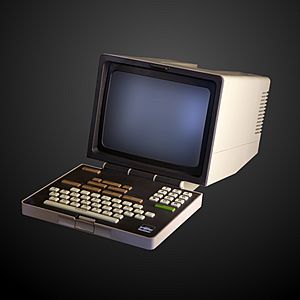Minitel facts for kids
The Minitel was an early online service in France. It let people connect to information and services using their telephone lines. It was very popular before the World Wide Web became common.
The Minitel service started in 1982. It was run by the PTT (Poste, Téléphone et Télécommunication), which was France's postal and telephone company. From the start, people could do many things online that we now do on the Internet. This included booking train tickets, checking stock prices, looking up phone numbers, sending messages, and even chatting with others.
Minitel was very successful for many years. In 2009, France Telecom (the company that ran it) said that 10 million connections were still made each month. The service finally ended on June 30, 2012.
Contents
How Minitel Worked for Users
Millions of Minitel terminals were given out for free to people who had a telephone line. This meant many homes and businesses could start using the service right away. If you got a free Minitel, you usually didn't get a paper phone book anymore.
Minitel offered many useful services, such as:
- The phone directory (which was free to use).
- Shopping from mail-order companies.
- Buying airline or train tickets.
- Getting information from various services.
- Accessing databases.
- Joining message boards to talk with others.
Paying for Minitel Services
Users could pay for services in a few ways:
- For purchases, like shopping, you could use a Credit card.
- For the time you spent online, the cost was added to your regular telephone bill. The price per minute depended on which service you were using.
France Télécom charged users up to about €1 (one euro) per minute. Most services were much cheaper. France Télécom then shared part of this money with the companies that provided the Minitel services.
The Popular Phone Directory
The most used Minitel service was the "Annuaire Electronique," which was the electronic phone directory. At first, you dialed "11" to reach it. Later, in 1996, the number changed to "3611." Businesses could add a few lines of extra information to their listing. There were also advertisements on the directory pages.
Minitel Terminals
Minitel terminals were special devices. They had a simple text-based screen, a keyboard, and a modem. The screen could also show basic graphics. Minitel terminals used the AZERTY keyboard layout, which is common in France, instead of the QWERTY layout often used in other countries. Users could also buy printers to connect to their terminals.
How the Minitel Network Connected
The Minitel modem usually dialed a special phone number. This number connected it to a PAVI (Point d'Accès VIdéotexte), which means "videotext access point." The PAVI then sent the information to the correct servers using a special network called Transpac.
In France, the most common number to dial for Minitel services was "36 15." For more expensive services, the number was "36 17." Many Minitel service names started with these numbers. So, "36 15" at the start of a service name was like ".com" at the end of a website address today.
Minitel used a special way to send and receive data. It could download information quickly (at 1200 bits per second) but sent information back more slowly (at 75 bits per second). This was called the '1275' system, or V.23. This system was mainly used for Minitel and similar services in other countries.
Similar Services in Other Countries
The United Kingdom had a service similar to Minitel called Prestel.
Images for kids
See also
 In Spanish: Minitel para niños
In Spanish: Minitel para niños
 | Janet Taylor Pickett |
 | Synthia Saint James |
 | Howardena Pindell |
 | Faith Ringgold |




